- Home
- Edward Cline
Hugh Kenrick Page 2
Hugh Kenrick Read online
Page 2
John Hamlyn did not join the other children, either, and they were glad of it, for he was a notorious fun spoiler who either threw tantrums if he did not win a game or bullied them into changing the rules so that he would. He was a thin, sickly-looking boy with a face scarred by a bout with smallpox. He sulked and roamed about the grass, undecided about whether to listen to the women’s gossip or to watch the men play dice, approving of neither diversion and resolving to report both to his parents. But he felt restless chiefly because he envied Hugh Kenrick. The other boy seemed not to need the other children, either, but for a reason he sensed was different from his own. And the other boy had something he did not so much wish to have for himself, as to take for the pure pleasure of challenging his right to it. After all, he was someday to be a baron—his parents never tired of reminding him of that—and this was a future baron’s prerogative.
Hugh Kenrick was oblivious to everything around him. It was only when the distant orchestra pronounced the first slow, regal notes of the overture that he became aware of someone standing near him. He looked up and saw John Hamlyn.
“I want it,” said the older boy, pointing down at the top.
Hugh Kenrick frowned in disdain, shook his head, and glanced back at his spinning top. Only his father or his uncle had a right to speak so arrogantly to him.
“I want it,” repeated John Hamlyn with finality.
To Hugh Kenrick’s amazement a bony hand reached down and grasped the top.
Hugh Kenrick rose and faced the barbarian. “You shall not have it. It’s mine.”
“It’s mine now,” replied John Hamlyn. “My uncle will speak to the king about it, and then it will be mine.”
From Hugh Kenrick’s perspective, this reply had no bearing on the matter. “Give it back,” he said quietly, “or I will thrash you.”
“If you touch me, my footman over there will hang you from that tree, and your father will be forced to pay damages.” John Hamlyn added with a smirk, “And I will still have this top.”
“So be it!” replied Hugh Kenrick, who kicked one of the boy’s shins, then smacked the surprised face with a fist, and then dove onto him, knocking him down. In a wink he was astride the boy’s chest, pounding the scarred face repeatedly, shouting “Let it go! Let it go!”
He snatched the top from his bawling enemy’s hand just before his valet and the other boy’s footman pulled them apart at the panicked urging of the governesses. “That’s no way for gentlemen to behave,” berated Bridget, “especially when His Majesty invited us all here to mark the peace! Peace! What am I to tell the master? Look at you!”
Hugh Kenrick dusted off his suit and readjusted his wig. “Gentlemen don’t steal from other gentlemen!” he replied.
“I didn’t steal your damned top!” shouted John Hamlyn. “I took it!”
“Men are hanged for stealing less value, John Hamlyn,” replied Hugh Kenrick, “even barons-to-be. Whether or not I saw you take it, it was still theft!”
This sophisticated rejoinder surprised both John Hamlyn and the adults, who had been ready to argue among themselves about which boy was at fault. But the younger boy had articulated an unanswerable moral position, and against this the adults had nothing to say.
“Keep your damned top!” shouted John Hamlyn, wresting himself from his footman’s grip. “My father will get me a bigger and better one than yours!” And he stormed off. The boy’s footman and governess followed, glowering at the back of their young master, whom they did not like, wondering how they were going to defend his and their conduct to his parents.
With a silent signal from Owen, the valet, Bridget rejoined the other women around the tree. Owen put a hand on Hugh Kenrick’s shoulder and bent to say, “It would seem that I have the better of two possible masters. Well done, young sir. Now, let us listen to Mr. Handel’s tune.”
They found another, larger rock farther away, and sat to listen to the music. Before Hugh Kenrick was a quiet, vast mass of people, some of whose heads he could see in the lamplight. Far above them, atop the column, shimmered the sunburst in a circle of its own lamps.
When the overture was finished, even before the audience had time to applaud the music, the air rocked with the concussion of the royal salute as one hundred and one cannon were fired, one after another, by artillery men deeper in the park. A great cloud of white smoke rose beyond the pavilion from the blank discharges. After another moment, the first rockets soared into the sky from the pavilion and burst over the crowds. The crowd gasped and noisily approved, while some children began to cry, frightened by the abrupt presence of the unnatural light. Then the great fireworks machine roared into life as conical towers, vertical suns, Roman candles, and giant pinwheels flared all at once, while more rockets whooshed high into the air and exploded in so many patterns, as though touched by some invisible power. Only a brilliant glow and part of the illuminated face of the pavilion were visible over the heads of the crowd.
It was a phenomenon Hugh Kenrick had never before seen. He stood up to watch the multicolored bursts of fire far above him as they lit up the roof of clouds that threatened the festivities. He chanced to turn around, and through a break in the trees, saw the reflection of the violence flash off the dome of St. Paul’s Cathedral far down the river, and reveal even London Bridge, and the rooftops and steeples of the city. If he had been able to articulate his thoughts then, he would have said to himself: What a vast city! It is a great city, where great things have been done, and where great things can and will be done. I shall live here someday, as a great man, and celebrate all the splendid things men are capable of. I shall do splendid things! This is a proper place for me.
It is not important that someone so young be able to express his deepest thoughts so precisely at the moment he has them; if he clings to the thoughts, and to the feelings they cause, he will someday have the words. Hugh Kenrick did not forget the feeling. He preserved it, and later was able to express it. Nor did he think it presumptuous to think of himself matching the greatness of the city; his response to it was a smile of joyful benediction. He did not challenge it; he approved of it.
It was a night of a nation’s celebration of peace. For six-year-old Hugh Kenrick, it marked the beginning of a war, for what he saw and heard, together with what he thought and felt, ignited another series of explosions as spectacular as fireworks, and would put him at odds with most men he would encounter. For while many men would experience the same things, but would let the glow fade and the fire fizzle out, Hugh Kenrick would not. Just as the fireworks lit up the spires and domes and roofs of the city and even the clouds above it, something lit up the peaks and valleys possible within himself. He was held rapt by the sights and sounds of that night, enthralled by some inchoate vision of his own make-up, by some tantalizing vista of the landscape of a soul that could be his. These things, he would realize in time, came from within himself, not from outside. He would grow to know, founded and sanctioned by the vision he would not release, that he owed nothing to anything external in terms of what he was, could be, or was to become, that nothing outside had a claim on him, except for what he chose to swear loving allegiance to.
* * *
With attentive though distant courtesy, Hugh listened without comment to the conversations of his parents, his uncle and aunt the Earl and Countess, and other guests at a long table at Ranelagh Gardens as the party was served dinner that night. The talk dwelt on the peace, on the fireworks, and on the absence of Countess Walmoden from the event. It was spiced with gossip about other notables, speculation on how the Duke of Montague was to be rewarded for his ostentatious loyalty to the king, and complaints about the weather. There was also ribald amusement over the likely fate of the Chevalier Servandoni, designer of the pavilion, who was arrested for drawing his sword and verbally castigating the Comptroller of the Ordnance for his negligence; an errant rocket had started a fire that destroyed one wing of his exquisite structure.
Owen, the valet, had dutifully
reported the fight between his charge and John Hamlyn to the boy’s father. Garnet Kenrick spoke to his son about it in the study of the Earl’s terraced house that overlooked the Thames in Westminster before they departed for dinner. “Couldn’t you have shared your top with him?”
Hugh Kenrick had shaken his head. “He wanted to keep it,” he said. “And I didn’t want to share it with him. You bought it for me. It is mine.”
“It doesn’t do to go knocking down the sons of barons, Hugh. Doubtless we will receive a note from Baron Hamlyn. Your uncle will smooth things over, but it will cause him some annoyance. He does not like to be distracted by trivial matters.” His father paused to sip some sherry. “However, we are fortunate in this matter. Baron Hamlyn is a particularly favorite enemy of your uncle’s.”
“Does it do for the sons of barons to behave like footpads?” asked Hugh.
His father scowled at him with mock seriousness, and bent a little closer to him from his armchair. “Does it do for a future earl to be so un-Christian in his thoughts and deeds?”
His father would not relent on the impropriety of his son’s own behavior, but the son noticed a twinkle of pride in his eyes. This caused Hugh to wonder why his father did not express what he felt, and why propriety was of more importance to him than was proprietorship.
But he did not think of these things now as he sat quietly in the gay, boisterous company. There were hundreds of guests at other tables all around him, and in the scores of boxes that ringed the promenade, and across the crowded space a small orchestra played gentle music as loudly as it dared, so much of his table’s conversation was drowned in the hubbub that rang under the great dome of Ranelagh. For all the festivity, he felt a curious emptiness, even an indifference. He was excited by something else, and did not know by what, but he was certain that it had little to do with the people and events of the day.
In an unconscious need for affirmation that something important had happened tonight, he slipped his hand into a pocket of his frock coat and felt the cool shape of the top.
Chapter 2: The Enfants Terrible
TWO DAYS AFTER THE FIREWORKS, THE KENRICKS LEFT LONDON. WHILE the Earl owned the house near the York Stairs, he disliked the city, and leased the house to men and women of rank more often than he used it himself. Home for the Kenricks was a great mansion near Danvers, in Dorset, on the south coast close to the fishing and quarry town of Swanage. It would be more correct to say that the estate was Danvers, for the little collection of houses and shops was enclosed by a manor of five thousand acres. Danvers—originally called D’Anvers—began as a settlement of Norman tradesmen and artificers, but over the centuries the nobility’s growing dominions encircled it. All roads passing through the Earl’s lands to Danvers could be tolled by him. The village drew its fresh water from wells on lands bought or seized by the Earl’s predecessors, and so he could charge the village for water. Much of the village’s sustenance was grown, bred, or fattened by cottars and free tenants on the Earl’s lands, and so the Earl profited doubly. The man sent by the freeholders in the neighboring town of Onyxcombe to Parliament was always the Earl’s man.
The Earl of Danvers was a power to contend with.
It had not always been so. After the Norman Conquest, an earl had little or no power; the title was honorific. Dukes had power. Marquises had power. Even lowly barons and baronets had power. In the Middle Ages earldoms proliferated as kings bestowed the status in reward for services rendered them. An earl was presented with a letters-patent, signed by the sovereign, which described the lands, privileges, obligations, and exemptions attached to the title. An earl acquired power by purchasing it from those who wielded it, or by performing some urgent service which left the beneficiary indebted to him.
If Hugh Kenrick was unruly, his ancestors were cravenly duplicitous. An early Kenrick, then a minor Welsh-Saxon nobleman and former vassal of King Harold, recently slain at the Battle of Hastings, was awarded a baronetcy for helping the Normans subdue other Saxons, which necessitated laying waste to villages that did not swear submission to William the Conqueror. There were many such villages in Dornsetta, and Kenrick so thoroughly erased their names from memory that they did not occur in the exhaustive Domesday Book, compiled by William’s army of roving commissioners to record every taxable entity in the country. He was crueler than even the Normans, for he could live only if no other Saxons were left who had the courage to challenge his treason, and this added a ferocity to his scourge. For the Normans, he exacted tribute from the dependable survivors—the meek, the humble, and the dutiful—and for himself and his descendants, the unquestioning obedience of the yeomen and serfs. For two centuries, no commoner in Danvers dared christen his son Harold.
The baronetcy was inheritable. The first Kenrick’s heirs languished for centuries in complacent obscurity until the Wars of the Roses in the fifteenth century demanded public commitment. In this thirty-year struggle between the houses of York and Lancaster for the throne of England, Baron Kenrick and his son swore allegiance to whichever side seemed on the verge of winning. The Kenricks rode as men-at-arms with the Yorkist knights at Blore Heath, and together slew six royalist knights. When Yorkist morale collapsed at the Teme River and men began deserting, under cover of darkness the Kenricks went over to Henry VI and the Lancasterians, and had the white rose on their banner dyed red. At Mortimer’s Cross, the Kenricks again threw their lot in with the seemingly unbeatable Yorkists. At dinner one evening, another baron suggested to his colleagues that the Kenricks should replace the white rose on their banner with an impaled chameleon. The baron was found dead in his tent the next morning, his throat cut. Baron Kenrick himself died soon afterward on the Aire River at the battle of Ferrybridge. His son assumed the title.
In the end, Richard III, because of his audacity and ruthlessness, won the allegiance of the new Baron Kenrick and his one hundred foot soldiers, but then lost them when Kenrick, riding with the Earl of Northumberland and other nobles at Bosworth Field, also elected to stand neutral when their king was betrayed by the Stanley brothers and overwhelmed by Henry Tudor’s forces. It became a family fable that young Baron Kenrick found the slain Richard’s crown in a bush on the battlefield, though the witnesses he claimed could attest to this fillet of glory were all fortuitously dead.
The Kenricks’ fortunes rose and fell over a century, until another Baron Kenrick, an impoverished country gentleman and hanger-on at the court of James I, and whose lands and manor were more a burden than an asset, oiled his way into the conspiracy of Lords Cobham and Gray to dethrone the king in favor of Arabella Stuart. He then joined the ranks of others who “confessed” the plot to James. He was rewarded with the earldom of Danvers. The earldom was created from the dissolution of two rival Dorset baronetcies, whose title holders were also implicated in the plot but permitted to live in exchange of a payment to James of one hundred gold Dutch guilders each. He enjoyed the title for six months, then one winter day died. The letters-patent signed by James allowed a male issue to inherit the title. His son, the new Earl of Danvers, was attacked by the disenfranchised barons, who were defeated in a skirmish. The young earl killed one baron and had the other beheaded by royal decree. After all, the Kenricks had been awarded Danvers by the king himself, and it was a capital offense to oppose the sovereign’s will.
A later Kenrick took no sides in the Civil War, nor for the duration of the Commonwealth and Protectorate, but gave succor to whichever side, Royalist or Roundhead, happened to encamp on his estate. His only active role was to give information to a Roundhead officer about the location and strength of a local unit of the Dorset Clubmen, a militia formed to deter depredations committed by both sides. This information led to the annihilation of the unit by a company of Cromwell’s New Model Army. His suspected sympathies were with Charles II, but the Earl vehemently denied that the king had hidden in Danvers at any time during his six-week flight to the continent.
A grandson of the first Earl, Baron and heir a
pparent Kenrick, rode with the Duke of Monmouth, nephew of James II, in 1679 and helped to defeat the Scottish Covenanters at Bothwell Bridge. Six years later, as Earl, he helped to rout Monmouth, now a protégé of the late Earl of Shaftesbury and John Locke, at Sedgemoor. The king ordered his nephew beheaded, and Kenrick gave evidence of the rebels’ treachery at the Bloody Assizes, which hanged over two hundred men and sent some eight hundred to Barbados to die in servitude. Many of these men had rallied to Monmouth’s cause when the Duke landed at Lyme Regis, in Dorset, and Kenrick had once quaffed port with them and called them friends. Kenrick was rewarded for his fealty with a writ of perpetuity for his earldom and a majority interest in a rechartered merchant company formerly owned by one of the executed rebels.
The Earl of Danvers labored, as many others did, to persuade philosopher John Locke to come out of exile in Holland and receive the king’s pardon for his role in the rebellion and for his critical remarks on the character and purposes of James II. If Locke could be lured back to English shores, the king’s gratitude would have been boundless, whether or not he actually intended to pardon the man. His return would have sanctified James’s tyrannical actions and indirectly acknowledged the Stuart’s right to sit on the throne and assume all the absolutist powers he wished to have. But the Earl of Danvers had no better success than had his competitors. His messengers at first could not locate the elusive thinker, but when one did, the man returned to Danvers with a sealed envelope containing a courteous note to the Earl. In it Mr. Locke said that he did not think he had done anything he needed to be pardoned for, and that the Earl’s generous offer of intercession on his behalf was therefore moot.
The stature of the man who could write such a note was beyond the Earl’s ken. He recognized only the slight, the absence of gratitude, and a lost opportunity. From that day on, the Kenricks remained resolutely monarchist, obsessively anti-republican, and only barely tolerant of Whigs.

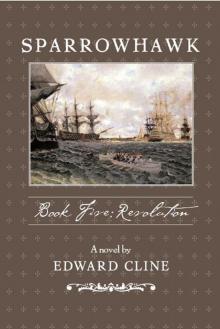 Revolution
Revolution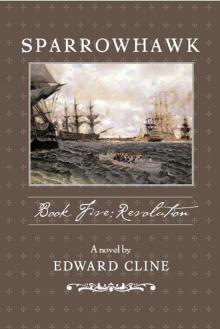 SH05_Revolution
SH05_Revolution War
War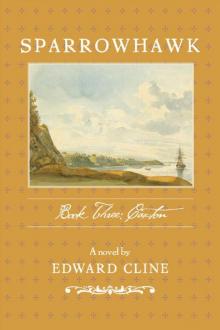 SH03_Sparrowhawk: Caxton
SH03_Sparrowhawk: Caxton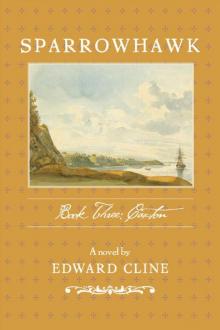 Sparrowhawk III
Sparrowhawk III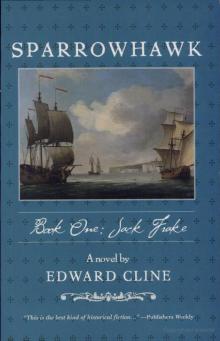 Jack Frake
Jack Frake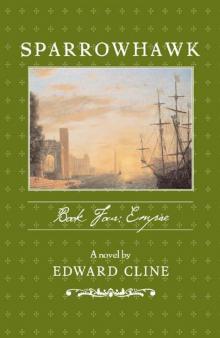 SH04_Empire
SH04_Empire Empire
Empire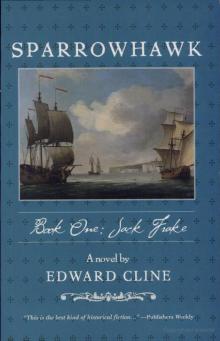 SH01_Jack Frake
SH01_Jack Frake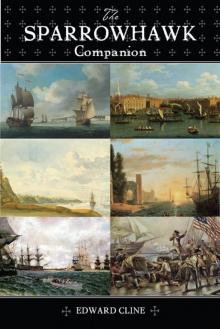 The Sparrowhawk Companion
The Sparrowhawk Companion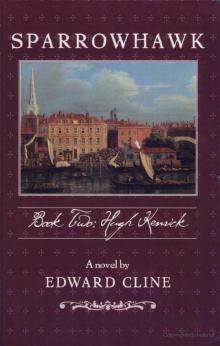 Hugh Kenrick
Hugh Kenrick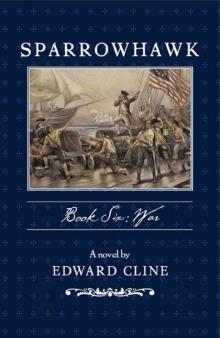 SH06_War
SH06_War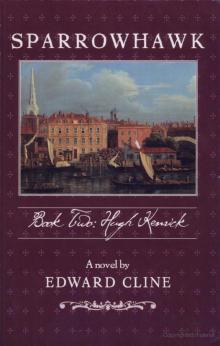 SH02_Hugh Kenrick
SH02_Hugh Kenrick